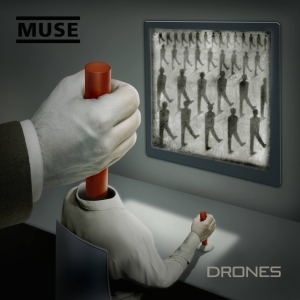As is immediately obvious from the horrendous cover art, Muse’s seventh record, Drones, is a concept album covering the overdone dystopian themes of humans losing their individuality and World War 3. After Muse’s fourth album, Black Holes and Revelations, it seemed the English trio were set for world domination, but after the release of the over-indulgent The Resistance and the under-whelming The 2nd Law, with this release Muse have found themselves under more scrutiny than ever before.
Unfortunately, the first three tracks to be released from the record were a mixed bag. First single, Dead Inside, showed promising signs with a Queen-esque introduction that reminds of Radio Ga Ga and features a humming bassline and electronic buzzes. The whole track is stripped down, allowing Matt Bellamy’s falsetto vocals to truly stand out, which culminates in an epic finale that is typical Muse.
However the other two songs, Psycho and Mercy were less successful. The former, although boasting a great riff, is a very repetitive track that is tarnished by a horrible break down and comical lyrics; a trait that is also shared with the latter. In addition, both tracks seem to have been spawned from blueprints of previous singles; Psycho‘s verses are evolutions of the military marching of Uprising, whilst Mercy is an unapologetic copy of Starlight.
Sadly the record continues in this unsure approach. Just as you think Muse have found their form with the supreme track Reapers, which mixes disco elements, guitar stabs, tapping arpeggios and a variety of lyrical styles into an excellent hard rock format, they go on a three track-long mid-album slump. The Handler comes to life halfway through, but it’s too late to salvage the turgid beginning and the ‘life’ is only provided by recycled Absolution-era riffery. Both Defector and Revolt rely too heavily on Muse stereotypes, but at least the former feels inspired, unlike the middle-of-the-road Revolt, that is too bland to label.
However, some solace can come from the album’s final moments. Aftermath begins with gorgeous blues guitar accompanied by orchestral swells and grows into a sincere love song, that shows Muse can pull-off more than Queen-inspired hard rock tracks. The Globalist begins similarly, but unlike Aftermath, it transforms into a monstrously heavy section, before fading away, showcasing more emotional depth than the rest of the album put together. Drones finally concludes with the eponymously-titled track which sees the band performing a cappella, which although is interesting to hear, doesn’t really accomplish anything.
It seems the most successful moments of Drones comes from when the band are experimenting, such as during The Globalist and Reapers, but all too often Muse settle for the same stereotypical musical traits that once helped them breakthrough, but now just serve as self-parody. Whilst the odd layered falsetto vocal and bizarre Manson touchpad solo is no bad thing, it does need to have purpose. I’m afraid that as Muse try to keep breaking musical ground, they are actually cornering themselves to one quite tiresome formula. In another review I read that Drones is Muse on autopilot, but I believe they never actually took off with this effort.
Overall: 4/10
Join the RockAtlantic mailing list by clicking on follow and, as always, press like if you enjoyed this blog and let me know your thoughts in the comment section below.
– James
Image: “MuseDronesCover” by Source. Licensed under Fair use via Wikipedia – http://en.wikipedia.org/wiki/File:MuseDronesCover.jpg#/media/File:MuseDronesCover.jpg
